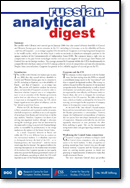The Limits of Managing Russia's Party System

Author(s): Alexander Kynev
Editor(s): Stephen Aris, Aglaya Snetkov, Matthias Neumann, Robert Orttung, Jeronim Perovic, Heiko Pleines, Hans-Henning Schröder
Series: Russian Analytical Digest (RAD)
Issue: 106
Pages: 14-17
Publisher(s): Center for Security Studies (CSS), ETH Zurich; Research Centre for East European Studies, University of Bremen; Institute of History, University of Basel
Publication Year: 2011
